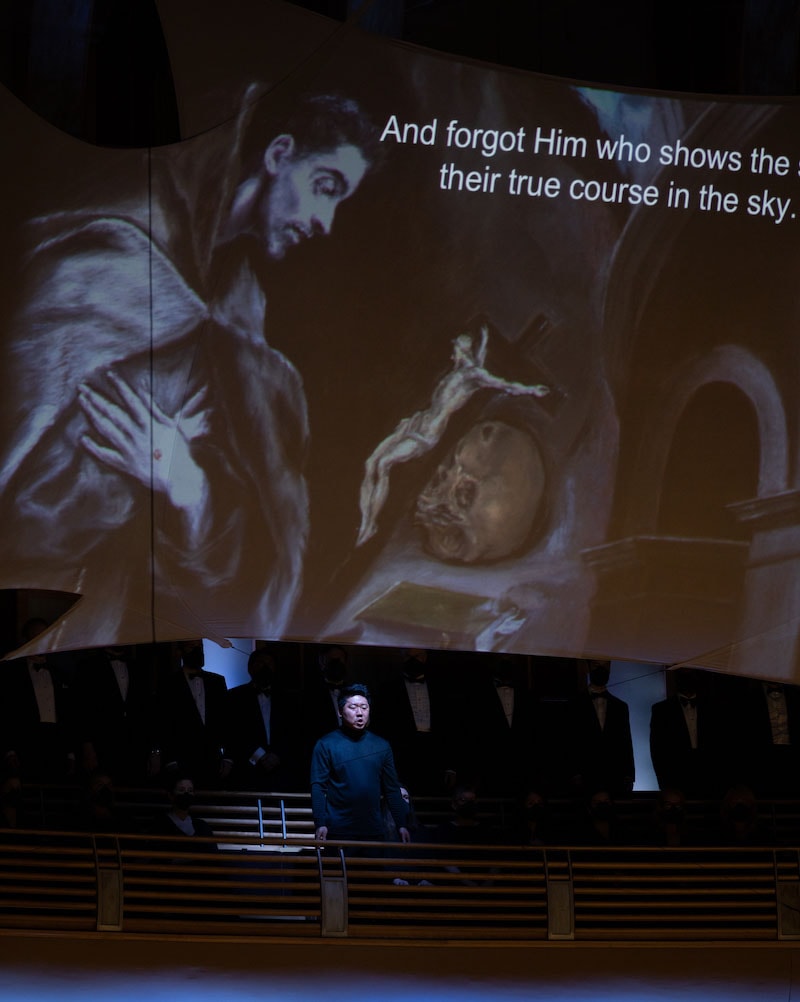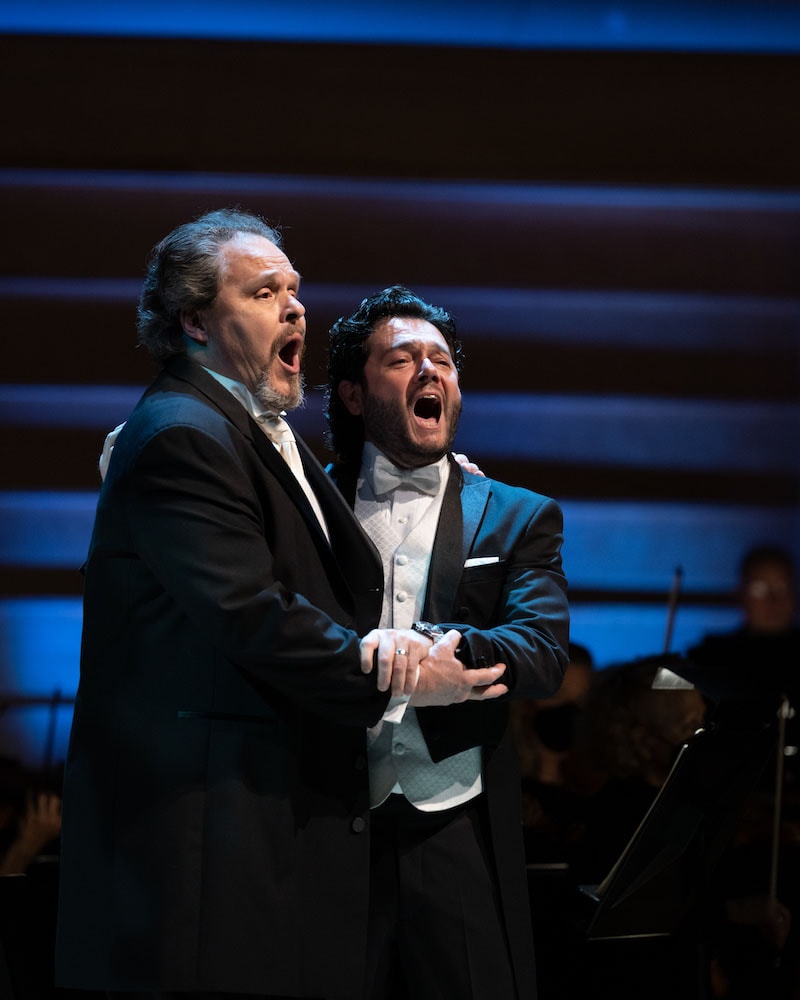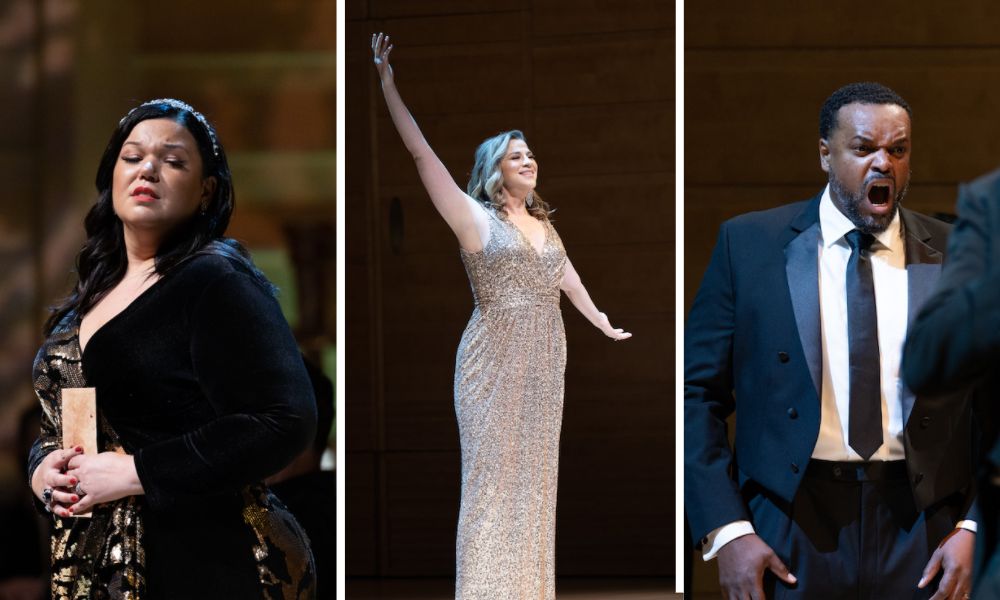Don Carlo came to us in concert version this past weekend produced by Maryland Lyric Opera, and the sheer heft of forces gathered might have launched an armada. Conductor Louis Salemno led an orchestra of 72 players plus a brass band of 20 and nearly 80 chorus members in the sonorous Strathmore Hall. The music was impressive, though at times it created such a wall of sound it masked the accomplished singers. And this was one of several complications.
Giuseppe Verdi composed the opera first in French to a libretto by Joseph Méry and Camille du Locle based on the German Schiller’s political drama set in Spain’s 16th century when the prince of Asturias had to step aside, foregoing his betrothal to Elisabeth of Valois (Elisabetta), to satisfy Hapsburg-Valois relations and the preferred strategic marriage between the woman and his father, King Phillip II.
The opera has been hacked, restored, and put into so many versions, that at its heftiest it clocks in at over four hours. Maestro Salemno chose the Milan four-act Italian version, the final one that Verdi had his hands on and approved, and still it comes in at a long three hours and 20 minutes.

Unlike MDLO’s triumph earlier this season with Turandot, which freed Puccini’s opera from any production distractions and was nonetheless able to deliver the story, the difficult plot of Don Carlo made the twists and turns confusing, as I heard in the intermission, except to the most experienced of Verdi lovers.
The plot is complicated, at times even fustian. Princess Eboli, in love with Carlo, in jealousy plots against him and the Queen. The chaste Queen has to bid farewell to another lady-in-waiting when the King flies off his handle. Eboli confesses she herself has been in a secret affair with the King. In an improbable bit of staging, Carlo draws a sword on his own father only to relinquish his weapon easily to Rodrigo, who is instantly elevated to Duke while Carlo is condemned. In this version, Rodrigo is mysteriously dispatched by gunshot (Inquisitor’s secret police we must surmise). There is also intertwined a ghost story, not entirely clear, where scenes take place at the tomb of Charles V, Carlo’s grandfather. Meanwhile, King Phillip gets advice from the Inquisitor on the question of the morality of murdering one’s own only to be assuaged that there is a precedent in God’s sacrificing his own Son for the common good, and he should therefore proceed.
It might have helped to have reinstated a scene from an early Verdi version, which shows Carlo espying then meeting and swiftly falling in love with Elisabetta. It would have brought us right away onto the lovers’ side. As it is, Elisabetta, already married to Phillip, is turning into a not entirely sympathetic stone monument as the chaste queen.

The real passionate relationship in this production is carried by the bromance between Carlo and his friend Rodrigo. Mexican Lyric Tenor Arturo Chacón-Cruz and Baritone Mark Delavan are accomplished artists and, in their duets, arms clasped around each other’s shoulders, listening attentively to each other, demonstrated they are engaged in moment-to-moment blending of their distinct voices. Chacón-Cruz soars vocally in his high notes. Delavan anchors him in moments; in others, he is led. Their characters’ relationship is also clear, for Rodrigo has come to Spain with an urgent plea to Carlo, as Spain is the preeminent world power, to help free his Flanders from the clutches of a terrible war being internally waged there. Dramatically things come into sharp focus.
The most stirring and resonating scene for me happened near the end of Act I, when in the opera five emissaries from Flanders arrive to plead further their country’s cause against tyranny. Hunter Enoch, Javier Arrey, Jose Sacin, Adam Cioffari, and SeungHyeon Baek make the most of this haunting melody and their dramatic objective, and their voices blend beautifully. Suddenly, I am transported to thinking about the war in Ukraine. When the chorus lends its considerable forces, the prayer becomes an anthem to liberate this invaded country from the terrors, suffering, and death caused by war.
What’s a tale of classical Spain without a good auto da fé? In place of parading heretics into flames for public spectacle, MDLO settles for a display of flickering red lights. But they augur a secret weapon, bringing on the phenomenal Bass Kenneth Kellogg as the Grand Inquisitor. His character is marched on as if blind, hands on the shoulders of his masked vassals and henchmen. Then he stands stock still — not as many park-and-bark opera singers, but in full embodiment of his character’s power, his hangman hands heavy at his sides. Kellogg uses his gorgeous deep tones to produce a sound of steely power and he conveys the opera’s theme where in the struggle between which is the stronger, church or state, there is no contest.

Soprano Elaine Alvarez as Elisabetta lovely abilities. I especially liked her sweet and soft rendering of “Non pianger mia compagna,” and the moving final duet with Chacon-Cruz “Ma lassù ci vedremo in un mondo migliore.” But in the performance I attended, she had a somewhat unreliable and wide vibrato. Mezzo-Soprano Catherine Martin as Eboli grew stronger vocally with every aria, culminating in a tour de force rendering of “O don fatale.” A pity her entrances and exits however did not carry the same energy. (O fatal flaw of concert opera!)
The performer who threw himself into his character’s dramatic staging was Andrea Silvestrelli, and as such he won the audience’s “popular choice” award. As King, Phillip Silvestrelli physically and emotionally conveyed the complicated emotions of this man. As stated in the libretto, this man who seems to rule the world cannot control himself. The singer unleashes lethal anger one minute, seethes with jealousy the next, then falls like a fawning dog at the feet of the Inquisitor, only to whimper and sob in the discovery that his wife no longer loves him (while we know he is an adulterer in their relationship). Silvestrelli dared to throw himself into the shifting emotions fearlessly, even if in moments compared to others on stage, he might be seen as overacting.
It would be amiss not to mention the fevered lighting design by Stuart Duke and the combination of surtitles and projections by Sarah Tundermann of classical paintings such as plucked from El Greco’s paintings from the same period as the story. Some found the latter distracting, but I thought they added greatly to the storytelling, in one moment depicting the blue grey limbs of tortured creatures that conjured up the bodies representing war crimes being committed daily in the current war. At other times, the projection of the Virgin’s red skirt seemed to morph into an abstract suggestion of the bloodied guilty hand of the Inquisitor, whose lust for absolute power brought about such a reign of terror. No surprise then that the opera, originally a people’s art form, reminds us that every generation must stand up to tyranny.
Running Time: Approximately three hours 20 minutes, including one intermission.
Performed in Italian with projected English titles.
Don Carlo played on May 13 and 15, 2022, presented by Maryland Lyric Opera performing at The Music Center at Strathmore, 5301 Tuckerman Lane, North Bethesda, MD.
Credits and artist bios are online here.




